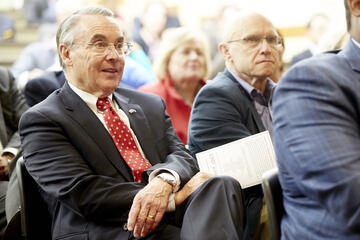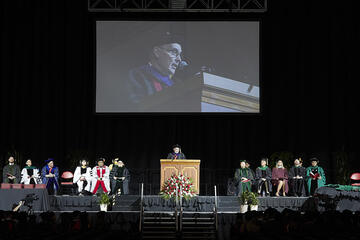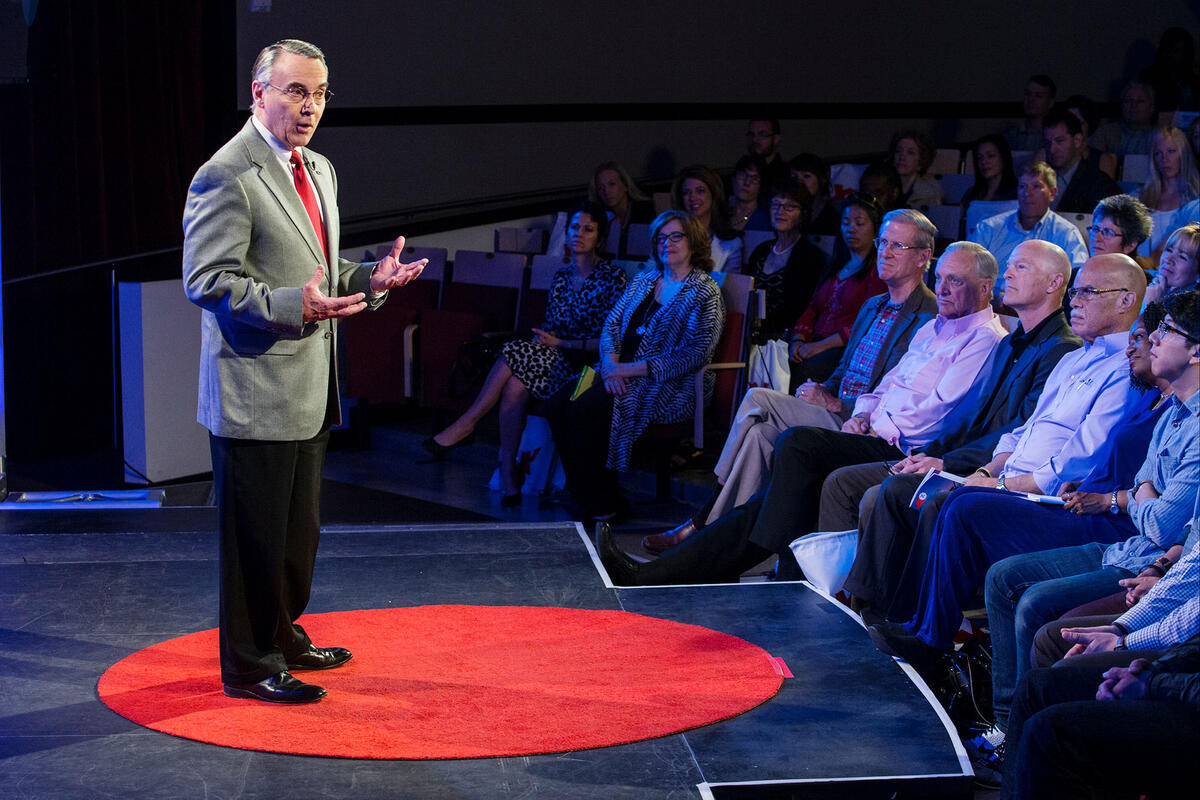Great needs deserve great deeds. Southern Nevada had many of the former. This man provides many of the latter.
“I had a school counselor who advised me not to go to college because she didn't think I would really do well,” says Don Snyder – a former UNLV president, hospitality college dean, and UNLV Foundation chairman, as well as business giant/community titan/philanthropic icon/Southern Nevada mover and shaker.
That counselor’s comment could qualify as a great miscalculation of talent and potential. Snyder’s approach for turning that critical assessment on its ear? “It’s the relationships that you make, the friendships that you build,” says the son of a South Dakota tire salesman. “The respect that you gain over the years is really important. If you create the right type of partnerships with people, they come back to you.”
A Man for All Seasons
Snyder became a central figure in Nevada as both a bank and gaming company president (First Interstate Bank of Nevada, now Wells Fargo, and Boyd Gaming Corp., respectively); a chairman and driving force to create a local performing arts hub (The Smith Center for the Performing Arts), as well as a football stadium for an NFL team he helped persuade to relocate here (Allegiant Stadium, where UNLV’s Rebel football team also plays); the CEO of a vital Vegas entertainment attraction (Fremont Street Experience); a proponent of K-12 education so dedicated that a local school here was named for him and his wife, Dee; and an activist determined to improve lives by chairing major fundraising campaigns (United Way of Southern Nevada).

His involvement with United Way helped pave the way for community work. “I saw how they touched lives with the agencies they worked with. And I saw that here in Las Vegas there were tremendous social service needs,” Snyder says. “I think what inspired me from a community point of view was getting involved with United Way. It fueled the passion in me to get involved and stay involved.”
All of those resume eye-poppers comprise only a partial Don Snyder resume. In Snyder’s autobiography, Taking the Lead, which he co-wrote with Las Vegas journalist Jack Sheehan, his longtime friend, Domenic Sica, summarized Snyder this way: “He never gives excuses, only efforts. I can say with conviction that he doesn’t dream of accomplishments, he just achieves them. He has squeezed every ounce of himself he possibly can into all facets of his life, and he has plenty more to go.”
Snyder’s journey fits snugly into the “rag to riches” category. As he wrote about his early years: “We lived on a farm in humble circumstances. There was no running water at our place. There was an outdoor toilet and an outdoor bathtub…Those first five years were spent living that type of very meaningful life, which is probably a healthy atmosphere that makes a boy appreciate the good things in life later on.”
A 12-year-old Snyder toiled in his dad’s tire shop, and later worked construction projects, changing tires on imposing earth mover vehicles (Yes, he can change his own flat tire without needing assistance from AAA). Those experiences – and where he experienced them – profoundly impacted him, as he wrote in his autobiography: “Living in two of the least populous states in the country growing up, South Dakota and (later) Wyoming, gave me an open attitude towards people that I think has served me well in my career.”
Asked what inspired his participation in higher education and his 30-plus-years involvement with UNLV, Snyder – who defied that school counselor by graduating cum laude with a Bachelor of Science in business administration at the University of Wyoming in 1969 – cites his experience that began in California and culminated in… Taiwan.
“I created the MBA training program for our bank in California [United California Bank]. And in creating that program, I was also involved in recruiting students, so I visited a lot of universities, primarily in the Southwest. And what I saw in those days was some universities that had great partnerships with the community and some that didn't. So that was kind of my early introduction to universities and how they can interact with business and the communities.”
Then came his position as a bank general manager in Taiwan, and his relocation to Taipei in 1980, just a few months after the U.S. derecognized Taiwan in favor of mainland China, triggering rough times there. “But what I saw in Taiwan was the business community coming together with government, coming together with the major university there, National Taiwan University, to come up with a really good plan. They were going to survive politically and economically. The business community coming together with government and the university was a tremendous partnership. The collaboration really did reinvent Taiwan and put them on a path of both economic and political sustainability.”
Don Snyder Meets UNLV
Years before he joined UNLV as an administrator, he commenced his relationship with the university as a volunteer. Initially a member of the UNLV Foundation Board of Trustees, he rose to the position of chairman, which he held for five years, and co-chaired the spectacularly successful Invent the Future capital campaign.
“We were challenged by not having a real philanthropic infrastructure,” says the man whose financial and management background ideally positioned him to help alter that. “The campaign that we ran really helped to create it, to fill that bucket and start to change philanthropically what the community was capable of doing.”
Yet, the project didn’t initially appear promising once a feasibility consultant weighed in. “I still remember having an executive committee meeting, probably 15 of us in the room, listening to the consultant,” Snyder says. “This was on the heels of 9/11, so it was a tough time in many regards for the country. The feasibility consultant came back and said that she doesn't feel it's feasible to do a $250 million campaign.”
The reasons? One, that the UNLV Foundation was relatively young and didn’t possess the depth required. Two, the university’s infrastructure wouldn’t be able to support a large campaign. And three, Las Vegas lacked a philanthropic infrastructure or a history of ambitious campaigns. “The wealth that we had in the community was kind of first-generation wealth, whereas a lot of communities, certainly communities back East, you have four, five, six generations of wealth and people were used to being wealthy, used to getting involved philanthropically,” Snyder says. “We didn’t have that.”
That, however, wasn't a deal-killer, merely an obstacle to be cleared.
“I still remember Jim Rogers [the late philanthropist and chancellor of the Nevada System of Higher Education] sitting in the meeting,” Snyder recalls of the consultant’s downbeat briefing. “He was on the executive committee in those days. He's got his arms folded, leaning back in his chair, and he said, ‘Well, that's all very interesting,’” says Snyder. Rogers went on to proclaim that the Foundation board should make a major leap of faith. He proposed that instead of retreating, they would defy the consultant and double the goal to a $500 million campaign, chaired by Rogers and Snyder. Result? They topped the goal, raising $537 million by 2009.

Come Aboard
Such a valuable, experienced and dedicated asset was, of course, destined to join UNLV in an official capacity. In 2010, the former Boyd Gaming president was persuaded to take over as dean of the William F. Harrah College of Hospitality.
“I worked very closely with Neal Smatresk, the president at the time, as we were finishing that campaign, and he and I would typically talk early in the morning just before our schedules got too hectic,” Snyder recalls. “He says, ‘Don, I'm going to ask you something and you're going to think I'm crazy.’ Then he went on to explain the process they've been going through [to find a new dean]. They had a national search for a dean. He didn't feel comfortable with any of the candidates. He had the flexibility of appointing an interim dean.”
Snyder listened but reminded the president that he was serving on four corporate boards at the time, as well as attending to his many volunteer commitments. “I said, ‘Neal, that's a big ask. Let me give some thought to it.’ I was going to say no, but he said such nice things about me on the phone.”
He consulted two trusted confidants: his wife, Dee, and his campaign co-chair Jim Rogers. “They said, ‘Don, why wouldn't you do it? They need you. You have a business background, and the university needs business experience.’ That dovetailed neatly into his oft-repeated mantra: “You can’t have a great community without a great university.”
Uber-busy as he was, Snyder took their advice – and the job – on a proposed interim basis. Several months later, the president asked Snyder to accept the permanent job, which he did.
“One of the things I clearly understood is that the world had changed in the last 25 years or so in the hospitality world,” Snyder says.
“A lot of me being there was to kind of challenge the norm, and we did, and the college made tremendous progress. It was during that time that we were clearly rated the No. 1 hospitality school in the world. I think it was because we had to shift things up, challenge the faculty, add some new faculty that brought new perspective and some new administration within the college. Doing a lot of what needs to be done in organizations in terms of refreshing it, particularly in a changing world.”
That included securing legislative and gubernatorial support for the college in 2013 to build a new academic building for the college.

Movin' on Up to the Top Job
Several years into his dean’s tenure, Snyder became increasingly involved in the effort to construct a new stadium for the Rebels – a project that expanded into the triumph of Allegiant Stadium, which attracted the Raiders to relocate here to Las Vegas and hosted the 2024 Super Bowl. In response, he and Smatresk decided to ease him out of the hospitality college into a strategic initiatives role. And then: Smatresk announced he was departing UNLV for the presidency of the University of North Texas, and Snyder was approached to become acting president of UNLV, a position he held in 2014 through January 2015.
That positioned him to have a hand in yet another major milestone.
“Probably the thing I'm most proud of is the UNLV School of Medicine,” Snyder says. “There were tremendous obstacles in front of that, but several years earlier I had chaired a gubernatorial commission that was set up by the late Gov. Kenny Guinn. I learned a tremendous amount about where our community was in terms of health care infrastructure. We were at the bottom end of most ranking metrics for that.”
As conversations on creating a medical school in Southern Nevada increased, Snyder says that he and other advocates for it “really strengthened our backbones, to move this thing forward against a lot of political opposition.” The gratifying result: The Kirk Kerkorian School of Medicine at UNLV was officially established on Aug.22, 2014 – on President Snyder’s watch – when the Nevada System of Higher Education (NSHE) Board of Regents approved funding for the school’s start-up costs.
“I was asked by the students of the second graduating class [May 2022] to be the commencement speaker at their graduation,” Snyder says. “The primary focus of my comments was the pride I had, and what they did in terms of getting their education during a very difficult period of time [the height of the COVID-19 pandemic], but then helping out in the clinics and doing what the School of Medicine needed to do to provide service to our community. It's a great example of community engagement and an absolutely tremendous thing to see.”
Another highlight: Participation in bringing the 2016 Presidential Debate to UNLV, the process of which commenced during Snyder’s presidency, when he received a call from Frank Fahrenkopf, co-founder of the Commission on Presidential Debates and former president/CEO of the American Gaming Association, with whom Snyder had a longstanding relationship. “He says, ‘I always had a dream this presidential debate at some point would come to Nevada. Do you think we can get it done at UNLV and in Las Vegas?’” Snyder says. ‘I said ‘Yes, I do.’”
Gaining approval, Snyder says, was difficult, but “putting UNLV on the world stage was spectacular. Having that opportunity came about primarily through my historical connections, and it reinforces one of the things that I've talked a lot about over the years: It’s the relationships that you make, the friendships that you build and the respect that you gain over the years that is really important.”
Lest we forget, the Allegiant Stadium/Las Vegas (formerly Oakland) Raiders project also was a milestone for Snyder. “I just feel really good that while I was president I had a chance — thanks to Bo Bernhard, the then the executive director of UNLV's International Gaming Institute — to host the first ever meeting with Mark Davis [controlling owner of the Raiders and owner of the WNBA’s Las Vegas Aces] about potentially bringing the Raiders here,” Snyder says. “That was an incredible opportunity. By the end of the meeting, Mark said, ‘Well, you know something? Maybe it does make sense for us to consider Las Vegas.’ This is right at the end of 2014.” And, as it turned out, it was coming to fruition during the sunset of Snyder’s tenure, with his presidential successor, Len Jessup, about to assume the job.
“Len and I hosted a meeting for the Raiders. They had probably 50 people with them — architects, executives from The Raiders, marketing people — that's when it became serious. I feel really proud that the Raiders are now here, and we started those conversations.”
All of these accomplishments – and many more with Don Snyder’s imprint on them – define leadership.
In recognition of his decades of supporting and advancing UNLV, Snyder was awarded the President’s Medal in 2000, an honorary doctor of laws degree in 2001, and was named (by the NSHE Board of Regents) a Distinguished Nevadan in 2003. The UNLV Lee Business School also inducted him into the Nevada Business Hall of Fame in 2011. In recognition of their significant philanthropic gifts to UNLV, Snyder and his wife, Dee, were inducted into UNLV’s Palladium Society in 2009. In June 2024, he'll transition to emeritus status on the UNLV Foundation Board of Trustees, but no doubt will always keep his ties to UNLV.
It's all quite a tally that proved a short-sighted high school counselor completely wrong.



